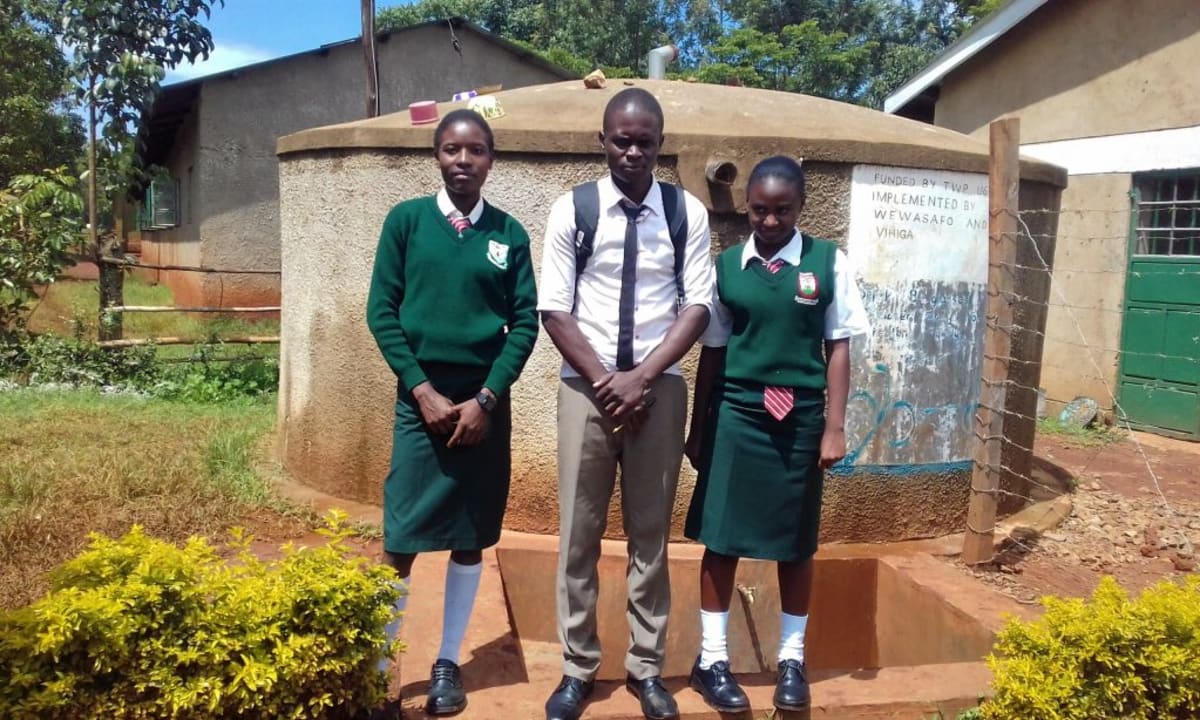This project is a part of our shared program with Western Water and Sanitation Forum (WEWASAFO). Our team is pleased to directly share the below report (edited for clarity, as needed).
Welcome to the School
Chambiti Secondary is a mixed day school located in Chambiti Village, Chambiti sub-location, Chambiti location, Vihiga Constituency in Vihiga County. The school was started in 2011 with only an early education department. The school grew from there, and now the secondary student population is 220, comprised of 99 boys and 121 girls. Chambiti Secondary also employs 11 teachers and four supporting staff.
Students report to school very early in the morning, but their first activity is to fetch water from the spring. The rest of the day is filled with class as usual, interrupted by short breaks and lunch. Chambiti Secondary is located far from traffic and busyness, making it a secluded area that is conducive to learning.
The school applied for a water project when three of their latrines were condemned after a recent health inspection visit.
Water Situation
The school has no reliable, protected source of water of its own. Students get water from a nearby protected spring which is also used by local households.
The school has a 4000-liter plastic storage tank that was donated by the European Union. Even if students managed to fill it every morning, it could hardly meet a day’s needs. Students are forced to break from classes to fetch water from the nearby protected spring, to which the school contributes 500 shillings monthly for maintenance. “This has scared parents and other boys and girls from joining this institution for they believe that a high school student ought not to fetch water from the spring to use in school,” the principal shared, “This practice is wasting much of our study time and has downgraded the school and lowered their all round performance.” “It is very shameful for Chambiti Primary School to look far much better than us, with enough latrines and many classrooms,” a cook at the school added in a bitter tone. “If there is any interventions from a donor, please beg them on our behalf to come to our rescue and save us this shame!”
Sanitation Situation
The school was initially sharing sanitation facilities with the primary section, but it managed to gradually build a few sanitation facilities of its own. Currently, the school has six doors of VIP (ventilated improved pit) latrines per gender and one urinal pit for boys. However, a latrine block of three doors has collapsed and was thus condemned by the public health team. The teachers have two doors over a single pit that serve both genders.
The school has one hand-washing station for students to use, but it was evident that the hand-washing culture is poor since the hand-washing station is situated far from the latrines. Nor did it have enough water, and it was missing a cleaning agent such as soap or ash.
Despite the difficult situations faced, the school’s attitude towards sanitation and hygiene is very positive. Classrooms were clean, and it was obvious that they are swept and mopped often.
Student Cynthia Nafulo said, “The greatest challenges we have are the shortages of adequate latrines for use, and poor uptake of hand-washing messages due to lack of clear knowledge on the importance, time and methodology to practice hand hygiene by the majority of the community members."
Plans: Hygiene and Sanitation Training
Students and staff will be trained over two days using Participatory Hygiene and Sanitation Training (PHAST), Community-Led Total Sanitation (CLTS), and Asset-Based Community Development (ABCD) methods. Training will include group discussions, lectures, presentations, handouts, a transect walk, and demonstrations. Training will also result in the formation of a child to child (CTC) club which will be responsible for demonstrating and promoting good hygiene and sanitation in Chambiti Secondary School.
Plans: Rainwater Catchment Tank
A 30,000-liter rainwater catchment tank will be constructed on school grounds. Teachers, students, and parents will gather local materials needed for this project, including sand, ballast, bricks, and hardcore. This contribution will fuel a sense of responsibility for the school and community to take care of their new facilities. Once materials are mobilized, the WEWASAFO team will arrive to lead the construction effort.
Plans: VIP Latrines
Two triple-door latrines will be constructed, providing three new latrines for each gender. Latrine materials will be mobilized the same way as the tank, ensuring the school feels these facilities are truly theirs.
Plans: Hand-Washing Stations
Two hand-washing stations will be delivered to the school before training. These come in the form of two 60-liter containers fitted with a tap. The training facilitator will demonstrate how to properly wash hands, and then students will have a chance to practice in groups. The child to child (CTC) club will be responsible for filling the hand-washing containers on a daily basis.
Chambiti Secondary School is ready and willing to do whatever necessary to make this water, sanitation and hygiene project a success!

 Rainwater Catchment
Rainwater Catchment
 Rehabilitation Project
Rehabilitation Project























